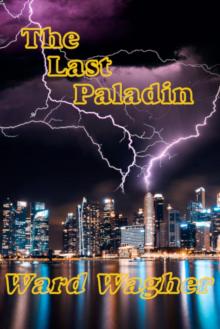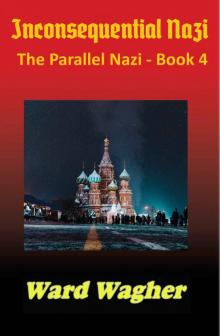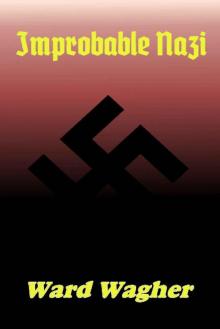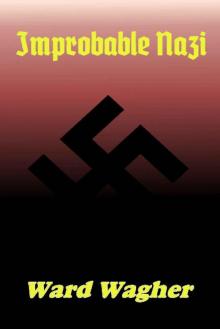- Home
- Ward Wagher
Improbable Nazi (Parallel Nazi Book 2) Page 2
Improbable Nazi (Parallel Nazi Book 2) Read online
Page 2
As they moved to the car, the guard force automatically shifted configuration in preparation to travel. Karl Rainer had initially trained the group and Alden had burnished their skills to a high sheen. With the rogue SS personnel yet to be located, Schloss was reassured by the competence of Alden Schlempke’s people.
Schloss studied the streets as they moved across the city. This was a holiday, and so there was not a lot of traffic – either on the streets or the sidewalks. Unfortunately, his plans to spend a quiet day with the children, and with Gisela were now overtaken by events. He would spend the day in his office, or in meetings with other members of the governing council.
A Thermos decanter of coffee rested on the credenza behind Schloss’s massive desk, apparently brewed on the promise of his being in the office promptly. He had to assume his secretary had either watched out the window or had a messenger to tell him of the Reichschancellor’s immanent arrival. He had brought Willem Kirche over from the party headquarters during the transition to power. The man had made a fine start to being his secretary when Schloss was the Nazi party leader. And the scant weeks since he had done nothing to disappoint the new Reichschancellor. The man is just quietly competent, Schloss thought.
Kirche followed him into the mammoth office to place more work on his desk. Schloss carefully hung his overcoat and hat on the rack in the corner as he spoke to the secretary.
“Piling more work on, Willem?”
“It never seems to stop coming into the office,” the man replied. “I must confess I was originally impressed at the amount of work in the party leader’s office. This dwarfs that, unfortunately.”
Schloss smiled as he slipped his pistol out of its holster and slid it into the right top drawer of the desk. “I made a dreadful mistake, you know.”
“And what would that be Herr Reichschancellor?”
“I assumed that since I was already more or less running the government, the work load would not change when we moved over here. I was wrong. How did I miscalculate so?”
“Was that a rhetorical question, Sir?” Kirche asked.
“I suppose,” he said. “There is no help for us whatever the answer.”
“In truth?” Kirche asked. When Schloss nodded, he continued. “Herr Hess disposed of a lot of the routine items that came through this office. He was actually a capable administrator in spite of his...”
“Frequent lapses into insanity?” Schloss filled in helpfully.
“Exactly. And Herr Himmler required no supervision whatever his faults.”
Schloss grabbed a cup and filled it from the decanter. “Very true. Karl knows what he is doing, but considering the ongoing challenge of getting the SS under control, he must consult with me often.”
“Herr Schreiber seems to consult you less often,” Kirche continued.
Schloss turned around and propped himself against the credenza as he sipped the coffee.
“Ach, that is good. It is unpleasantly cold out there today. And, to answer your comment, Herr Schreiber probably has fewer challenges, at least of the sort Rainer faces. I think they are both equally capable. Now… what forest fires must I attack before the council meets this morning?”
“The Reichsmarshall called to request his absence from the council meeting this morning.”
Schloss had started to sit and, and immediately jumped up again. “What?” he shouted. “Is that porcine slob still squatting out at Carinhall? He ought to know better than that.”
“I believe he was inspecting damage in the city this morning. He wished to visit some of the anti-aircraft sites.”
Schloss blushed slightly as he sat down. “I apologize for shouting at you, Willem. I didn’t let you finish your explanation.”
Kirche shrugged as though it was no matter. “If you need to shout, I am not offended, Herr Reichschancellor. You endure pressures far worse than I would be able.”
“Very well. Get a message to the Reichsmarshall and ask him to come to the Reichschancellory after he has completed his visit to the anti-aircraft sites. I do not wish to interrupt him. The people will appreciate seeing him out and about.”
“Of course, Herr Reichschancellor. I call your attention to the military news summary on your desk.”
Schloss nodded. “Please arrange my schedule so that I may have lunch with my family.”
Kirche responded and Schloss waved absently. He had already focused his attention on his desk. At Renate’s suggestion, Kirche had added several clerks to this staff. They labored mightily to keep the paper in check. When Schloss thought about what they faced every day, he was motivated to do his part to attack the masses of paper that flowed through the chancellery.
§ § §
December 25, 1941; 10 AM
Reichschancellory, Berlin
“The news out of the Far East is not good for the Americans,” Joachim von Ribbentrop said. The Foreign Minister sat to Schloss’s left at the enormous granite table in what was now known as the Reichschancellor’s meeting room.
“It appears, though, the English pulled a rabbit out of the hat in the Gulf of Siam,” Schloss said.
“The report was not very clear,” Peter Schreiber said. The Minister of Propaganda sat to Schloss’s right.
“We would probably need Herr Goering to explain in detail,” Schloss said, “but I think those two English aircraft carriers arrived in time to sortie with the Far Eastern fleet. They chewed up the Japanese invasion fleet. It’s hard to draw conclusions on sparse intelligence, but our people think that the English may hold on to Singapore for the time being.”
“The size of the English fleet out there is such that this may be a temporary state of affairs,” Ribbentrop said.
“We think the Indomitable took a torpedo hit,” Schloss said. “The English news services claim she made it back to port. Meanwhile the invasion of the Philippines continues. There is no further news from Hawaii, so I infer the Japanese have control of the islands.”
“And they are no longer on speaking terms with us,” Ribbentrop said. “I am surprised they have not broken diplomatic relations.”
Schloss snorted. “That is certainly not something I lie awake worrying about at the moment. Although, it would probably be good for us to keep the lines of communication open with them. We might need it sometime.”
“We have problems closer to home to deal with,” Rainer said. “The people are unhappy with last night’s events.”
Schloss shook his head. “I feel badly about that. The Christians were free to celebrate Christmas for the first time in years and the bombs fall on them. We need to talk about a way to send a pointed message to the English. The city was wide open and they took full advantage of it.”
“We should have been paying attention,” Rainer said.
“Very true, Karl. We got sloppy.”
“Should we mount a maximum effort raid on London, then?” Rainer asked.
Schloss had been playing with his pencil during the discussion. He now tapped the eraser head on the table. “We have to ask ourselves, why would they attack Berlin? They haven’t touched the city for five months.”
“Why indeed?” Ribbentrop asked, although it seemed more of a comment.
“Could they be trying to induce us to hit London?”
Schreiber looked thoughtful. “We have been making a fairly determined effort at military targets. Suppose we have been hurting them worse than we thought?”
“I have wondered the same thing,” Schloss replied. “In any event, I do not propose to bomb London. For one thing, it is too big. I suppose we might get lucky and kill Churchill, but that is not something I would bet on. No, whenever the Reichsmarshall gets here, we will begin looking for an appropriate target.”
“Very well, Herr Reichschancellor,” Ribbentrop said, “what should we be working on for the moment?”
Schloss looked over at the foreign minister. Anxious to get back to your fireside and your schnapps, Joachim? he thought. “I want Peter to draft a s
tatement from the government expressing outrage at the unprovoked attack. Then I want you to make sure all the foreign diplomats get a tour of the bomb damage. I want to scream about this over the radio. I want the English to look like a bunch of madmen.”
“Bit of pot calling the kettle black, though,” Ribbentrop commented.
“Joachim, are you with us or not?” Schloss shouted. “I don’t want to remind everybody how many people Germany has killed in the past two years. I want them to see those poor Germans who wanted nothing more than to worship in peace. They will forget the other soon enough.”
Ribbentrop turned pale. “Herr Reichschancellor, I apologize. I meant no disrespect.”
“Well, what did you mean?”
“I just thought the English would immediately respond with a recitation of our deeds.”
“We don’t give them a chance. Peter, do you think we can do this?”
Schreiber nodded. “Yes, Herr Reichschancellor, I believe we can.”
Schloss looked at his watch. “I promised my family I would have lunch with them. We will return here at three this afternoon. Hopefully Hermann will be here as well. We will make some decisions.”
With that Schloss stood up and walked quickly from the room.
“He is very angry,” Ribbentrop said into the silence.
“Then what were you thinking to bait him like that?” Schreiber said sharply.
The foreign minister shook his head. “I did not realize how upset he was. I suppose I should get back to my office and make plans to speak to the diplomatic community. Are you returning to your office, Herr Schreiber?”
“No. I am invited to lunch with the Reichschancellor. In his current mood I am not so sure it is a privilege.”
Rainer gathered his notes and stood up. “I suppose I shall see you here in a few hours, Mein Herren.”
“If anything comes up in the meanwhile, I will contact you,” Kirche said.
Schreiber jumped slightly, then laughed. “Willem, you are so quiet I often forget you are in the room. Forgive me for ignoring you.”
Kirche smiled. “Sometimes being ignored is a good thing.”
Rainer smiled slightly and waved. “I shall be on my way, then.”
Ribbentrop marched out of the room without another word. Kirche looked over at Schreiber.
“Walk with me, Peter. We will catch up with the Reichschancellor. I know we were both invited to lunch.”
Schreiber walked across the room. “May I assume that being ignored is preferred to having my brother-in-law yell at you?”
“You are perceptive as usual, Herr Schreiber.”
“I am frankly shocked at the English,” Schreiber said. “It has been clear they were not interested in treating with us, but I thought they were satisfied with the low level of activity across the channel.”
“Could they be in a panic over the events in the Mediterranean or North Africa?”
“Things are not going well for them in that theater,” Schreiber replied. “At least at sea. As usual the Italians are making a hash of things in Africa.”
“Are we going to have to assist them?” Kirche asked.
“Was that a touch of sarcasm?”
“Oh, of course not, Herr Schreiber. How could you even suggest such a thing?”
“Right. And there is my brother-in-law, waiting impatiently at the end of the corridor.”
“Then we should be on our way.”
Schreiber nodded and they walked further to meet with Schloss.
CHAPTER THREE
December 25, 1941; Noon
Reichschancellor Apartments,
Reichschancellory, Berlin
As he entered the personal living quarters of the chancellor, Schloss was once again struck by the difference between the public and private lives of Adolf Hitler. The Fuhrer’s working office, which was now the Reichschancellor’s office was built to a heroic scale, as was the entire building. Schloss felt like a pygmy every time he entered the place, and he had decided that was probably Hitler’s intent.
The apartments were a different story. They looked like they had been decorated by an old lady, and were very much to that scale. The janitorial crew for the chancellery had spent several hectic days thoroughly cleaning the apartments under the careful supervision of Frau Marsden. Schloss thought it was amusing that they were as terrified of her as was everyone else.
Gisela and Frau Marsden had also spent time replacing the furniture in the place. It was slowly beginning to resemble something he would have chosen, and he was happy with that. It seemed Gisela and he had similar tastes.
The children had adjusted quickly. They not only established their territory around the Chancellor’s apartments, but quickly gained ownership over the entire building, much to the bemusement of the guards and the inhabitants of the offices. Schloss was mainly delighted to see the shadows disappearing from their faces, particularly Anna-Lisa. Frau Marsden thought it highly improper for the children to roam the halls of the Reichschancellery, but in that regard, she was reduced to a minority of one. Schloss actively encouraged it, and the Schreibers and Gisela seemed to enjoy their activities.
“Poppa,” Anna-Lisa squealed when she spotted Schloss entering the apartments. She quickly ran over to where he swept her off her feet, and swung her above his head.
“And how is my favorite princess today?”
“We were allowed to play in the snow in the courtyard this morning,” she said in her precise voice.
“And were you and Hans able to build a snowman?”
“Oh, yes, Poppa! We made a snow soldier.”
“Did you, now?” He looked down to see Hans-Friedrich marching towards him. “And how is Hans this fine day?”
Shortly after Schloss had assumed power in Germany, his son had declared he would be addressed as Hans. He said that Hans-Friedrich made it sound like he was a child.
“It was pleasant not to have to attend school today, Poppa,” Hans said. “Frau Marsden made me promise to study this afternoon.”
“A little study is always good,” Schloss said.
He set the little girl down and walked into the parlor. Gisela sat next to Renate and the two women were in deep conversation. He reflected again upon the events that brought him to this place. He now had a family that cared for him. And he had met a woman, Gisela, who had turned out to be the great love of his life. And he had his hands upon the levers of power in what was arguably the most powerful nation on Earth. How sterile his life as a history professor in 1982 Berlin had been!
His sister spotted him first. “Oh, good, Hennie. You’re here. Frau Marsden is tapping her foot.”
“Far be it from me to incur the wrath of Frau Marsden,” Schloss said with a smile. “Where is Peter?”
“He went to wash his hands. I expect him to reappear presently.”
Gisela stepped over to thread her arm through his in a way that allowed their hands to clasp. “And how was your morning, Darling?”
“Unpleasant, actually. I was out viewing the results of last night’s mischief.”
“All those people,” she said. “That was so sad. What were the Englanders thinking?”
Schloss decided it was better not to mention that the Germans were doing their best to drop bombs on the city of London not too many months previously.
“I suspect they were hoping for an advantage,” Schloss said. “I am convinced this will turn around to bite them severely. We have put a lot of effort into convincing people that Germany is a good citizen of the globe. It appears those efforts are beginning to bear fruit.”
“At the expense of our dead Berliners,” she said bitterly.
Schloss nodded to acknowledge her thought. And it was sad, he thought, that he was so cynical. He truly wondered how much he had changed in the previous six months he had spent on this world, wherever it was. He wondered if he had changed the world as much as it had changed him.
“It is what it is,” he said, rubbing his hands toge
ther. “I often think the greatest sin of governments everywhere is the inability to truly be concerned about the little people. And some of ours paid the price last night.”
“What will you do?” she asked.
He shook his head. “Hermann should be in the meeting this afternoon. We will work on a response.”
“Like bombing London?”
He snorted. “The last time the Englanders tried something like this, the Fuhrer retaliated by bombing London. That may be what motivated them this time.”
“I don’t understand,” she said.
“If we are concentrating on London, we are not bombing their ports, airfields and factories.”
Frau Marsden had slipped into the room and she interrupted them by clearing her throat. It was more of a subterranean rumble, something like a mine cave-in, he thought.
“Your luncheon grows cold, Herr Schloss,” she said.
Schloss looked at Gisela and winked slightly. “Very well, Frau Marsden. We are on our way.”
The aroma of roast pork loin filled the dining room. While there was now a team of government employees working in the kitchen and providing other services to the Reichschancellor’s apartments, Frau Marsden ruled them with a rod of iron. She intimidated the house servants to the point where none seemed to have any temptation to cross her.
Once again, Heinrich Schloss could lose himself in the family he had inherited when he landed in this world. His precious children had shaken off the grief and turmoil of the death of their mother earlier in the year. They had weathered transition from their home in Charlottenburg to the apartments here in the chancellery with excitement and anticipation, rather than fear. He decided the children were more courageous than he.
Schloss had no family in postwar Berlin, other than a distant friendship with his wife. Here, now, he had a sister and her husband, both of whom were now dear to him. Renate had apparently been the best friend of the Alter-Schloss, as Schloss called him. And he now trusted her implicitly. Her husband Peter was also a friend and a confident. Even his short association had allowed him to confidently assign him to the ministry of propaganda after Goebbels’ death.

 The Mountains of Montora (The Chronicles of Montora Book 1)
The Mountains of Montora (The Chronicles of Montora Book 1) Nazi Magician: Inventor
Nazi Magician: Inventor The Last Paladin
The Last Paladin Inconsequential Nazi
Inconsequential Nazi Impossible Nazi
Impossible Nazi The Snows of Montora (The Chronicles of Montora Book 3)
The Snows of Montora (The Chronicles of Montora Book 3) The Margrave of Montora (The Chronicles of Montora Book 2)
The Margrave of Montora (The Chronicles of Montora Book 2) Gravity Rising (The Parallel Multiverse Book 2)
Gravity Rising (The Parallel Multiverse Book 2) ruBracks, Nazis, the Death of the Universe & Everything (The Parallel-Multiverse Book 1)
ruBracks, Nazis, the Death of the Universe & Everything (The Parallel-Multiverse Book 1) Improbable Nazi (Parallel Nazi Book 2)
Improbable Nazi (Parallel Nazi Book 2) Accidental Nazi
Accidental Nazi Improbable Nazi
Improbable Nazi